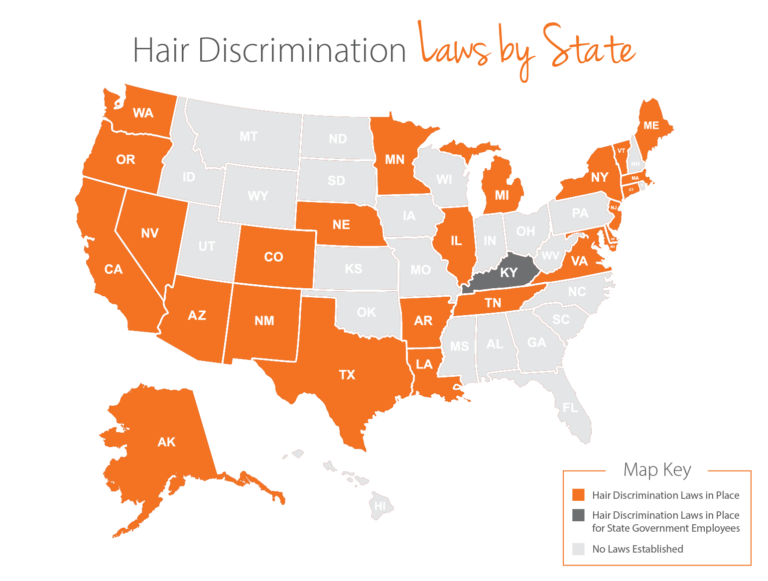Legally, employers can’t discriminate based on employee or applicant demographics. Specifically, you can’t treat someone differently because of their “race, color, religion, sex (including gender identity, sexual orientation, and pregnancy), national origin, age (40 or older), disability, or genetic information” (EEOC).
To stay compliant, HR needs to follow this general rule as well as several specific regulations about different types of bias. For example, the CROWN Act bans race-based hair discrimination. In this article, we’ll cover what the CROWN Act entails, which states follow it, and what it means for employers.
What is the CROWN Act?
The acronym CROWN stands for “Creating a Respectful and Open World for Natural hair.” It was originally introduced in 2019 to protect students and workers from race-based discrimination against natural hairstyles, including textured hair, braids, locs, twists, and knots.
Hair discrimination disproportionally affects Black women and girls. For example, one study found that Black women are 1.5 times more likely to be sent home from work because of their hair (The CROWN Act). The CROWN Act ensures women, girls, and anyone with a natural hairstyle will be protected from this kind of bias.
Why is the CROWN Act Necessary?
In 2023, Dove and LinkedIn teamed up to commission the CROWN Workplace Research study. Their findings paint a clear picture of hair discrimination:
- Black women with textured hair are twice as likely to experience microaggressions at work than Black women with straighter hair.
- Black women are nearly twice as likely to feel they have to wear their hair straight if they want a job interview to go well.
- Black women’s hair is 2.5 times more likely to be seen as unprofessional.
In many cases, this is a form of unconscious bias. It could also be an issue with your employee handbook. (When was the last time you updated your company dress code?) But whatever the reason, these attitudes can make it hard for Black women to succeed at work.
What Does the CROWN Act Mean for HR?
Since 2019, more and more states have adopted CROWN Act regulations. Make sure to consult with your legal team to see what applies to your business. If you’re subject to any of these laws, HR should take the following steps:
- Review and revise your dress code, ensuring it’s free from bias.
- Update your onboarding practices and train hiring managers as needed.
- Educate your HR team on the hair discrimination law and teach them how to recognize potential bias.
- Make resources about the CROWN Act available to your employees.
- Establish clear reporting channels so employees can report hair-based discrimination without fear of retaliation.
- Create a clear, unbiased workflow to investigate complaints, like an anonymous form.
- Stay apprised of any updates to local laws and be prepared to update your policy as needed.
Want to take it a step further? HR can also partner with employee resource groups (ERGs) to get feedback from their members and other employees. If you solicit their advice, make sure to follow through and address their concerns directly. This process can be difficult, but it’s a great way to build trust with everyone on your team.
Which States Follow the CROWN Act?
As of 2024, 25 U.S. States have passed hair discrimination laws:

- Alaska
- Arizona
- Arkansas
- California
- Colorado
- Connecticut
- Delaware
- Illinois
- Louisiana
- Maine
- Maryland
- Massachusetts
- Michigan
- Minnesota
- Nebraska
- Nevada
- New Jersey
- New Mexico
- New York
- Oregon
- Tennessee
- Texas
- Vermont
- Virginia
- Washington
Kentucky has a similar law, but it only applies to state government employees. Other states have considered CROWN Act regulations without passing them, and some lawmakers are pushing to enact federal legislation. HR can expect these laws to change significantly in the next few years. Stay in close contact with your legal team to keep your business compliant.
How Paycor Helps
Paycor’s resources empower leaders to build company culture. For example, our AI-powered recruiting software is designed to reduce implicit bias in the hiring process. Once an employee is hired, anonymous Pulse surveys collect feedback in an anonymous, psychologically safe environment, so HR can identify discriminatory practices as soon as they arise. Discover how Paycor can help foster an environment that prioritizes DE&I.










